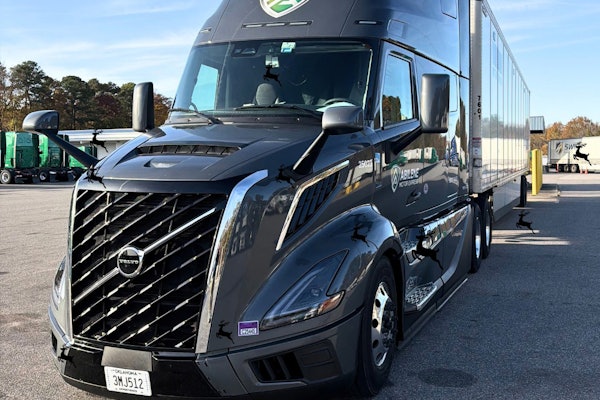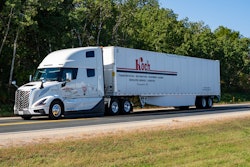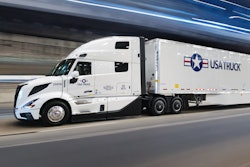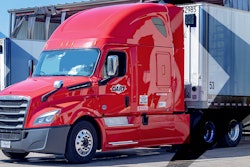Peterbilt medium-duty hybrid vehicles will launch into full production as early as March of 2008, the company announced during its press conference at the 2007 Great American Trucking Show, held last week in Dallas. Peterbilt will offer two medium-duty hybrid configurations – the Model 330 hybrid-electric for pick-up and delivery applications, and the Model 335 hybrid-electric for stationary PTO applications.
“Peterbilt continues to be an industry leader in developing advanced hybrid solutions that increase fuel efficiency, reduce emissions and improve service requirements,” says Bill Jackson, general manager of Denton, Texas-based Peterbilt and Paccar vice president. “In fact, customers who have already implemented our medium-duty hybrid systems into their operations have reported significant results of up to 40 percent greater fuel savings.”
Peterbilt’s Class 6 hybrid-electric system, developed in conjunction with Eaton Corp., is a Model 330 for pick-up and delivery applications. The Model 330 is powered by the Paccar PX-6 engine rated at 240 horsepower and 560 lb-ft of torque. With the hybrid system engaged, horsepower increases to 300 and torque to 860 lb-ft. This configuration is suited for stop-and-go use, such as urban pick-up and delivery, with the hybrid system resulting in 30 to 40 percent greater fuel savings by using electric power to accelerate the vehicle from a stop, Peterbilt says.
Peterbilt’s Class 7 hybrid-electric system is a Model 335 for stationary PTO applications. The Model 335 also is powered by the Paccar PX-6 engine, which regenerates lithium-ion batteries to electrically operate the PTO, suitable for municipal and utility applications. Fuel use, emissions and noise are greatly reduced, according to the company; during typical stationary operation of the PTO, the engine needs to run only about 1/6th of the time versus non-hybrid vehicles; the engine automatically starts to regenerate the batteries, which takes about 4.5 minutes.
Both trucks use a parallel hybrid system with an electric motor that assists the mechanical diesel engine with supplemental torque for improved fuel economy. The system stores energy during stopping through a process called regenerative braking, and then reuses it for acceleration. In the case of the Model 335, in which the vehicle is equipped with a PTO, the system also stores energy during idling to power the PTO.
Maintenance requirements also are reduced from less wear on the engine and the brakes, as its workload is supplemented by the electric motor and the charging of the battery retards the motion of the vehicle.
Heavy-duty hybrids
In addition to Peterbilt’s two medium-duty hybrid vehicles, the company says it also is actively developing and testing technology for two heavy-duty hybrid configurations – a hybrid-electric heavy-duty vehicle for long-haul applications, and a hydraulic-hybrid heavy-duty vehicle for vocational and stop-and-go applications.
“In this heavy-duty application, fuel efficiency and emissions reductions are best achieved both while the truck is rolling or standing still,” says Peterbilt Chief Engineer Landon Sproull. “The system’s batteries power the heating, air conditioning and vehicle electrical systems while the engine is off.”
When the idle reduction mode is active, engine operation is limited to battery charging, an automatically controlled process that takes about five minutes per hour to fully charge the system. A proprietary feature minimizes engine vibration during start-up and shutdown during the recharge periods, allowing the driver to rest without interruption. The Model 386 hybrid electric is expected to be available in 2010.
The system is designed to recycle a truck’s kinetic energy to conserve fuel and assist in acceleration. While in fuel economy mode, testing has proven a significant improvement in fuel efficiency and also has shown more than a 50 percent reduction in brake wear, the company says. The system also reduces engine and transmission wear, potentially extending component life and lowering service costs; it also is more environmentally friendly by decreasing exhaust emissions and noise, according to Peterbilt.
Peterbilt Preferred Card available
Peterbilt also announced at GATS that it continues to offer loyal customers more than $1,500 in discounts on parts and services with the Peterbilt Preferred Card, now available at participating Peterbilt dealerships throughout North America. The Preferred Card features thousands of dollars of various discounts from more than 30 quality brand-name manufacturers, as well as select service work performed at Peterbilt dealerships – many of which offer multiple or unlimited redemptions.
“The Peterbilt Preferred Card is an opportunity to reward our loyal customers with exclusive discounts that can result in thousands of dollars in savings,” says Scott Pearson, Peterbilt assistant general manager of sales and marketing. “Customers can also manage their Preferred Card account online with easy access to profile information, available discounts and purchase and savings history.”
The Preferred Card can be purchased at participating Peterbilt dealerships for the suggested retail price of $9.95. Cards can be registered at the dealership or by visiting www.peterbiltpreferred.com, a secure website dedicated to Preferred Card members only. At the time of registration, customers also can provide an e-mail address that gives them access to additional bonus offers, special promotions and program updates. In addition, customer service also is available through the website or by calling 888-722-8606.









